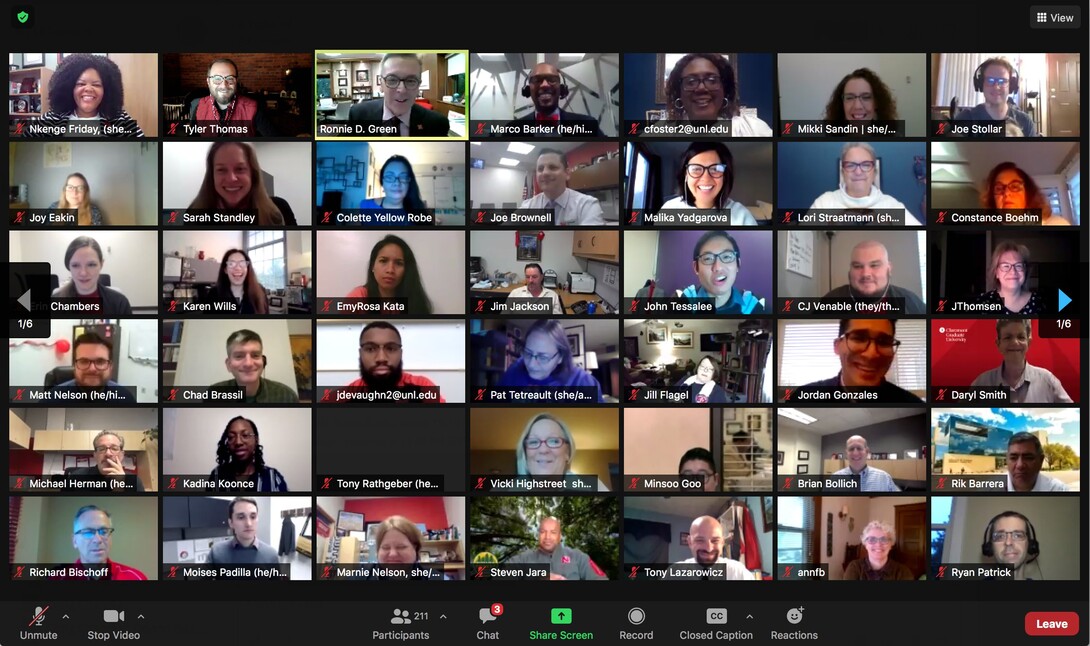
Nearly 300 members of the campus community gathered virtually Oct. 22 for the university’s second-annual State of Diversity summit.
The event, hosted by Nebraska’s Office of Diversity and Inclusion, provided an in-depth look at what steps the university has taken over the past year to cultivate a more inclusive environment for current and future Huskers, as well as what progress needs to be made.
“One of the first questions I’ve had to ask myself lately is, ‘What keeps us from making progress?” said Chancellor Ronnie Green, who opened the forum. “Sometimes, I believe it can be us. There are instances where we may not always see the way forward, or how our own bias or our lack of understanding can be a barrier. I think that this self-reflection and learning is critical for us, especially if we carry a number of blind spots and inherent privileges. I know it has been essential for me.
“Part of my path as a leader, and someone who cares about the well-being of this university community and Nebraska very deeply, has been to challenge my thinking and challenge what I know.”
In his introduction, Green gave an update on the Journey on Anti-Racism and Racial Equity, which launched this past summer in response to protests and racial unrest across the country.
“This has been a different, and a distinctive approach, from past approaches,” Green said. “While this work is more behind-the-scenes, I am confident that you will see changes in action as our efforts unfold.”
Green added that the University Police Department is also working to develop a more community-based policing strategy under Hassan Ramzah, Nebraska’s new police chief.
One encouraging trend from 2020 is the university’s increasingly diverse undergraduate student population. The fall 2020 freshman class saw an increase of 11% in underrepresented minority students, representing the highest level of diverse enrollment in Nebraska’s history.
However, diversity in faculty and staff continues to lag, said Marco Barker, vice chancellor for diversity and inclusion. Of Nebraska’s tenure-track faculty in 2020-2021, only 25 are Black and 55 are Hispanic, compared to 762 who are white.
“Given these numbers, as they look visually to us, what does this look like and feel like for individuals who are less represented,” Barker said. “It makes the campus look and feel very stark in terms of being able to build community and connect with other people who look like you.”
Barker sees increasing diversity in faculty and staff as a key priority, and said doing so is achievable with a collective change in mindset.
“Typically in searches, we say that there are just not enough qualified applicants. That’s more of a deficit model. We have to shift our framing from, ‘There’s just not enough qualified applicants’ to ‘There are qualified applicants, and it might be either the way that the way that the ad is written, or the way that we’re doing the search, or maybe there are networks that I’m not a part of where there are qualified applicants, and that maybe that is what’s keeping us from being able to diversify our pools.’ I really want to emphasize and urge us to be thoughtful about this,” Barker said.
While the past year has been hard on many, especially people of color, Barker said it’s also provided a unique opportunity for reflection and growth in the area of inclusive excellence.
“We know that these are extremely difficult times that we’re living in. We know that there has been, more than ever, this reminder of injustice and resistance to addressing structural racism, combined with a global pandemic,” Barker said. “But I think that this time also calls for us to really value life, really value each other and what it means more than ever to really care about someone else.”
Data presented during Barker’s presentation will be made available in the coming weeks. The second half of the State of Diversity featured a panel discussion led by Barker. A video of the panel discussion will be made available soon.







